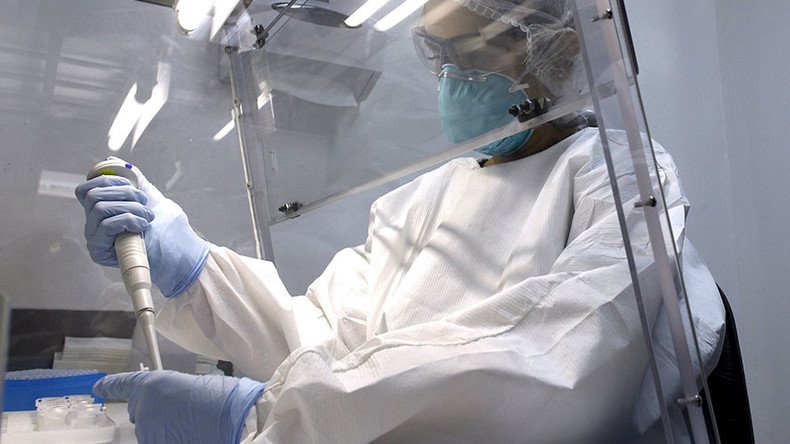First Zika medical test developed in Germany

German researchers have developed a diagnostic test that can accurately detect the Zika virus in humans. Until now, the only way to determine if someone had the illness was to wait to see if the disease’s distinctive symptoms appeared.
Genekam, a German biotechnology company, has created technology that can not only reveal the presence of Zika pathogens in a blood sample, but also shed light on the quantity in the patient’s blood, Deutsche Welle (DW) reports.
GM mosquitoes could be cause of #Zika virus outbreak - Oxitec critics https://t.co/Kwk3aZEyHvpic.twitter.com/F5EMLfN1aY
— RT (@RT_com) January 30, 2016The new test can therefore definitely determine if a person is a carrier of the Zika virus, as only one in five people infected actually becomes ill, the media reports. Additionally, the test renders diagnostic results in real time, which is relatively quick for a virus of this kind.
“Our test examines DNA and works with chemicals that react to the Zika virus only,” Sudhir Bhartia, a virologist and one of the co-developers of the innovation, told DW. The researcher also added that the test provides sufficient accuracy, as “similar pathogens like Dengue fever won’t show up in the results.”
However, the technology has its limitations, as it can only be employed in specialized medical facilities and laboratories having the appropriate equipment and personnel with sufficient know-how.
“The test must only be used by qualified personnel so that mistakes can be avoided,” Bhartia stressed.
At the same time, it is rather cheap, costing about €5.
#ZikaVirus spreading explosively, 4mn may be infected, no vaccine expected for years - WHO https://t.co/pSv5rUhrYJpic.twitter.com/zVWz41SjPA
— RT (@RT_com) January 29, 2016According to Deutsche Welle, the first kits containing the new tests have already been sent to Brazil, which is suffering from a Zika virus epidemic in which up to 1.5 million people may have been infected. Under normal circumstances, the test would go through a lengthy authorization phase. However, due to the emergency situation in South America, authorities have made an exception in this case.
The Zika virus has been rapidly spreading across the globe since the first cases were reported in Brazil in May of 2015. Between three and four million people have been infected with the virus worldwide, according to WHO data.
The infection is believed to be mainly transmitted by the Aedes aegypti mosquito, which is present in all continents, including the southern United States and the Mediterranean region. According to medics, the virus is generally not dangerous for healthy adult people. Its symptoms, if they emerge at all, are much like those of a usual flu.
Not just mosquitoes: #ZikaVirus may be transmitted through sex – US health authority https://t.co/QD8FkbaAzcpic.twitter.com/HN670Py46J
— RT (@RT_com) January 29, 2016“If you show no symptoms three weeks after you return, they’re not going to manifest anymore,” Christian Drosten from the German Society for Virology told DW, referring to tourists returning from territories affected by the ongoing epidemic.
“And two weeks after that, the virus will no longer be present in your body,” he added.
At the same time, the virus could be particularly dangerous for women in their first trimester, as it is suspected to cause microcephaly, a birth defect that results in an underdeveloped head and brain.
However, German medical specialists have called the connection between Zika virus and birth defects into question.
“There are still too many aspects we don’t understand about the Zika virus to say it directly causes microcephaly,” Drosten said.
#ZikaVirus: What you need to know about the latest global health scare https://t.co/h5ii56hRkGpic.twitter.com/TRgeecwPt0
— RT (@RT_com) January 23, 2016According to Deutsche Welle, the Brazilian health ministry has received reports of 4,180 birth defects suspected to be microcephaly, of which it has managed to investigate about 700. Only 270 of those birth defects were actually confirmed to be microcephaly-related, and Zika virus infection was present in less than 10 of those cases.
“I think it’s possible that there’s only a very loose correlation between the Zika virus and microcephaly,” Drosten said in commenting on this data.
“The health risk may not be big, but these women have a tough time psychologically and are burdened with ethical concerns,” he added.
As of now, five people have been diagnosed with Zika virus in Germany. All of them had returned from areas hit by the epidemic, Bavarian Broadcasting Company Bayerischer Rundfunk reported. Meanwhile, German Health Minister Hermann Grohe plans to oblige Germans and report all cases of infections involving insect-borne pathogenic diseases. The upper house of the German parliament is expected to vote on the minister’s proposal in mid-March.
‘Level of alarm is extremely high’: Obama makes call to action as #ZikaVirus spreads https://t.co/Et1AWNCZKbpic.twitter.com/YKDiK7uscz
— RT (@RT_com) January 28, 2016US President Barack Obama and his Brazilian counterpart, Dilma Rousseff, agreed during a telephone conversation on Friday to create a high profile expert group in order to “step up fighting” against the Zika virus and develop a vaccine for the disease.
“We will win this fight,” Rousseff told the governors of the Brazilian regions beset by the virus.
On February 13, Brazil plans to deploy more than 200,000 troops to spread awareness of the Zika virus. The uniformed soldiers will walk around Brazilian neighborhoods handing out leaflets and mosquito repellent door-to-door, Health Minister Marcelo Castro said in an interview on Wednesday.












